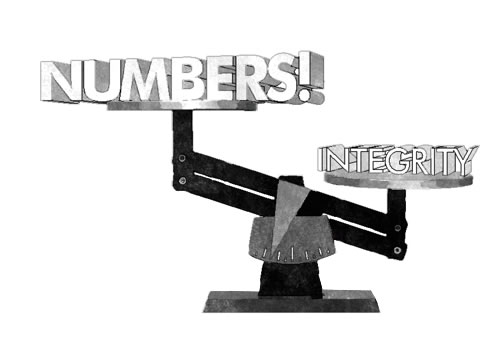A More Inclusive Model
“I was raised to be charming, not sincere…”
– The Handsome Prince, Into the Woods
It’s not surprising with the decline in ethical behavior around the world of late, that we find ourselves opting for shorter presentations, and longer periods of materials review. We spend less time listening, looking or engaging with a speaker, and more time paging through their submission, in hopes of limiting their opportunity to spin the story with their over-the-top-delivery skills. After all, the facts are the facts, so we should be able to make a clear headed decision with a minimum of fuss.
So goes the thinking… From our purview it appears that we have arrived at a summit of limitation, where our standard means of rating business presentations allows for a wholesale flood of pitches which are, while perhaps accurate, neither charming, nor sincere.
The human element seems to be taking a beating in terms of relative importance. Who needs to actually speak with a principal when making a business decision, when one can simply Google it, or demand a comprehensive report and get everything there is to know about a person, a corporation, a company or an issue? (Or so we surmise…)
That perspective is on ample display in many board rooms, as the presentations and pitches become less and less about people, trust, commitment or relationships. We’re increasingly finding ourselves sitting around tables, looking down at data, or up at a screen, reading through reams of data, while pretty much ignoring the speaker or our colleagues. It’s a perspective rooted in the consideration that decisions should be analytically sound, based on facts and logic and remain unclouded by emotion or personal relationships. Fine, but is it possible that this triumph of purely analytical decision making leaves out anything of significance? The integrity of the players perhaps?
While it makes sense to give factual analysis its day, have we perhaps forgotten that this is not a “Facts OR Feelings” decision, not “Either/OR” at all, but a decision that should consider all the various and far flung details, influences, and unseen vested interests?
—Hamlet
We suggest that when more information is instantly available than at any time in history, it makes sense to build a new, more broadly inclusive decision making model.
The Fusion Model:
What should be sought, discovered and presented in order to arrive at a responsible, reliable decision?
I. The Analytical Data: All the objective, analytical and numerical data about income, expenses, taxes, interest, standard practices, etc.
II. The Field Reports / The Tour
III. The Background: Human Experiential Balance Sheet of Each Speaker
IV. The Performance Itself: Every Pitch has an element of drama in its genes
V. The Analytical and Intuitive Perceptions (Hunches) of the Judges
Indeed, it’s the coming together of the Analytical and the Intuitive which makes this model a bit more balanced than the strictly numerical judgements rendered in many pitch evaluations. We suggest that an honest recognition that some things lend themselves to numerical evaluation, and some things don’t, is a completely rational foundation upon which to build a more solid decision making process. (On a scale of one to ten, how dishonest do you believe their Team Captain to be? Remember, he was raised to be Charming, not Sincere.)
Applications
1. For You
When you’re a consumer of presentations, be certain to take the analytical side seriously! It’s unforgivable to miss an obvious financial, logical or analytical indicator. But then, step back, allow yourself to breathe for a moment and then come back with more focus on the intuitive, emotional, trust and intention side of the equation. What is this really about? What is the speaker leaving out? Why? What unspoken implications are crying out to be investigated more thoroughly?
2. As a Speaker
Don’t fail to do the due diligence! But then, make room to allow your passions to find their way into your advice and performance as well. Even though it’s getting iffy to discuss how you feel about things, people will still notice the speaker who cares deeply about their work. Passion sells, even though there’s no place for it on the eval sheet!
3. At Home
It’s a fact! The culture is getting more and more hypnotized by physical reality, at the expense of the intellectual and the spiritual aspects of life. But as a partner and parent, you can have a powerful effect on your family’s “Fullness of Life” as you keep reminding your household and community about the fact that life is a ‘‘Body, Mind and Spirit” composite. Beauty, passion and lofty purpose should not be forgotten on the altar of text and numerical analyses.
4. At Work
Give yourself permission to both have feelings, and respond to them. There’s no shame in coming to some conclusions for reasons other than mere analysis. There’s also the ability of an individual, a team or a division to inspire confidence and risk taking. So both as an individual and a manager, don’t fail to keep the analysis sharp and comprehensive. But don’t stop there, go further and reach for a more fully balanced and holistic approach to decision making.
It’s not enough for a presentation, a pitch or a decision to be merely factually accurate. It’s not enough to be charming, it’s also got to be sincere.
And, at the end of the day, it’s got to be the right decision! So be aware, that in these charged times, we need every kind of input and every decision making indicator brought to bear on our every undertaking.
Charming, yes! Sincere, absolutely. But in the end, Right!
Subscribe to our Newsletter


